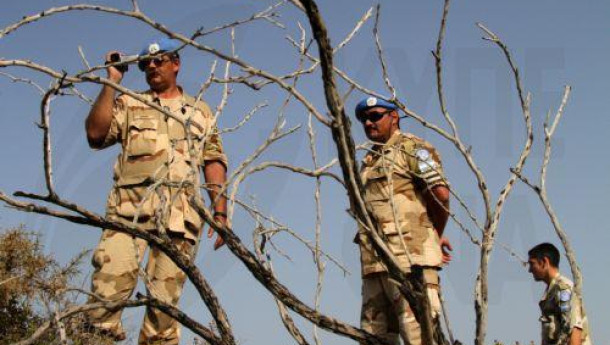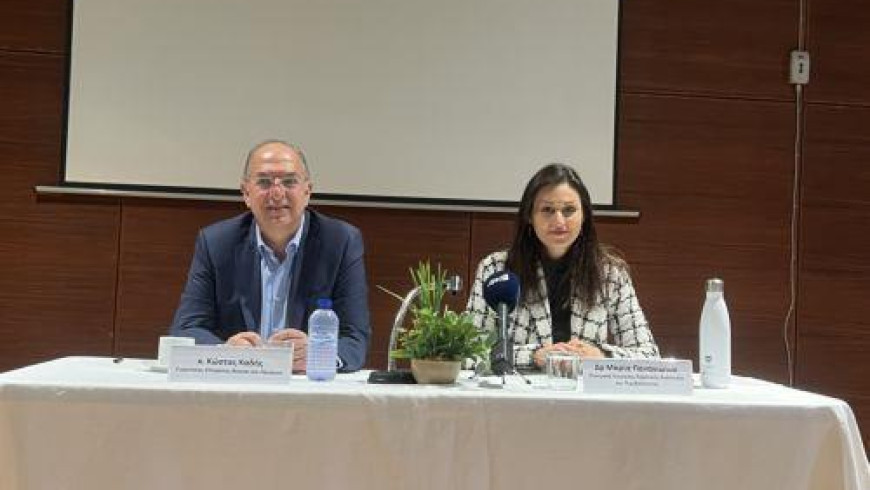
The UN Security Council extended the UN Peacekeeping Force's (UNFICYP) mandate for another year until January 31, 2024, on Monday instead for six months as was the case until now adopting resolution 2674 (2023), which was circulated as an official document.
The UN Security Council extended the UN Peacekeeping Force's (UNFICYP) mandate for another year until January 31, 2024, on Monday instead for six months as was the case until now, adopting resolution 2674 (2023), which was circulated as an official document.
The resolution welcomes the "continuing personal engagement of the Secretary-General and that of his team" and reiterates "its support for his proposal for a UN envoy to lead further engagement which could provide critical support in the search for common ground with the goal of returning to formal negotiations."
It reaffirms "all its relevant resolutions on Cyprus, in particular resolution 1251 (1999) and recalls the importance of achieving an enduring, comprehensive and just settlement based on a bicommunal, bizonal federation with political equality, as set out in relevant SC resolutions, including paragraph 4 of its resolution 716 (1991)."
The Security Council "fully supports the SG's ongoing engagement with the sides and encourages further rounds of informal talks and reiterates the importance of the sides and all involved participants approaching this process in the spirit of openness, flexibility and compromise and showing the necessary political will and commitment to freely negotiate a mutually acceptable settlement under UN auspices, and continues to urge the sides to engage actively and without further delay with the SG and his team to this end."
It further "urges the sides to reach an agreement regarding the proposal of the SG to appoint a UN envoy, who could provide critical support in the search for common ground with the goal of returning to formal negotiations for a lasting settlement in Cyprus."
In relation to Varosha, the Security Council expresses "deep regret" as regards the continuation of unilateral actions that run contrary to its previous resolutions and statements on Varosha and calls for the immediate reversal of this course of action and of all steps taken on Varosha. Also, it adds that "any further unilateral action may prompt a response from the Security Council and continues to stress the need to avoid any unilateral actions that could raise tensions on the island and undermine the prospects for a peaceful settlement."
It commends the ongoing work of the Committee on Missing Persons, and calls upon all parties to enhance their cooperation with the Committee’s work, in particular through providing full access without delay to all areas and responding in a timely manner to requests for archival information on possible burial sites.
The Security Council further expresses concern regarding the continuing tensions in the Eastern Mediterranean, and underlines that disputes should be resolved peacefully in accordance with applicable international law, remains convinced of the many important benefits, including economic benefits, for all Cypriots and the wider region that would flow from a comprehensive and durable settlement, reiterates the Secretary-General’s previous call to avoid escalatory steps, and further calls upon the leaders of the two Cypriot communities and all involved parties to refrain from any actions and rhetoric that might damage the settlement process and that could raise tensions on the island.
Among other things, it calls upon the two leaders "urgently" to reinvigorate their efforts to provide the necessary support and overall guidance to free the Technical Committees from political obstructions in their work, ensure effective coordination and cooperation on criminal matters, strengthen efforts to promote peace education across the island, improve the public atmosphere for negotiation to secure a settlement and increase their support to and ensure a meaningful role for civil society engagement in peace efforts.
Following the adoption of the resolution, Permanent Representative to the United Nations, Ambassador Andreas Hadjichrysanthou, said that "the unanimous decision of the Security Council, without any disagreement, is indicative of the support provided by the Security Council" on the agreed solution basis. And this is reflected in the resolution".
He further spoke of three important points relating to the resolution.
The first has to do with the fenced off part of Turkish occupied Famagusta, known as Varosha, for which he noted that “the Security Council sent a strong warning message to prevent new provocations from Turkey in Varosha." "The vocabulary used is quite strong and we welcome it," he pointed out.
The second point, he added, has to do with the negotiation process. "The Security Council strengthened the wording regarding the appointment of the Secretary General's envoy."
The third point concerns the twelve-month extension, "which is a new element". It is, he explained, a matter which has been the subject of discussion with various SC member for some time now. He added that what was important for Cyprus was for the six-monthly cycle of UN SG reports to continue, which is a fact, noting that this is evident from the resolution.
On the missing persons, he said that "unfortunately, the wording used this time is the same as the previous ones." "We would like to see stronger wording because the issue of missing persons is purely humanitarian. There is a stagnation in the numbers of locating missing persons and this is shown by the data of the Committee on Missing Persons in Cyprus (CMP). We would like to see a stronger message from the Security Council to speed up the process of solving this problem," he added.
It should be noted that the renewal of the mandate of the UN Peacekeeping Force in Cyprus is extended for twelve months, but the Security Council will be informed every six months about both the Peacekeeping Force and the Good Services from the Reports of the UN Secretary General. The resolution requests the SG to submit his two reports by July 4, 2023 and January 3, 2024 respectively.
Cyprus has been divided since 1974, when Turkey invaded and occupied its northern third. Repeated rounds of UN-led peace talks have so far failed to yield results. The latest round of negotiations, in July 2017 at the Swiss resort of Crans-Montana ended inconclusively.














 3287.99
3287.99 1275.09
1275.09
